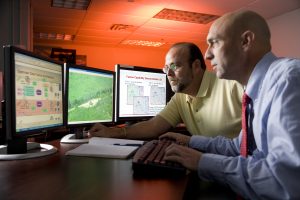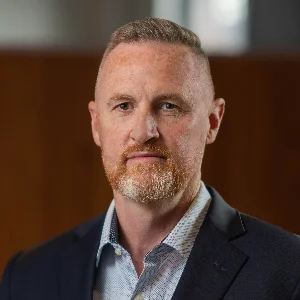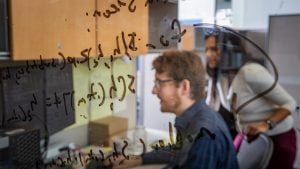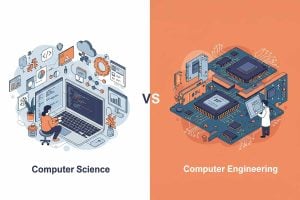
Johns Hopkins Computer Science Program Overview
Ranked #1 in IT by U.S. News & World Report, Johns Hopkins Engineering’s Computer Science program provides computer professionals, scientists, and engineers with a full range of dynamic instruction and skill-building opportunities through online, part-time options. Study a variety of areas including theory, analysis, design, and implementation of information systems, or tailor your education for a narrower, relevant approach.
Structured and rigorous courses help you master the skills you need to truly make an impact in your field and advance your career. To guide your learning experience, you will have access to a team of top-level scientists, researchers, and engineers who actively practice what they teach, including experts from the Johns Hopkins Applied Physics Lab. You can also opt to engage in meaningful research through our uniquely designed Capstone course.

Our students are also innovative problem-solvers. Take a look at some of the research projects and presentations completed by our graduate computer science students.
As a graduate of the Master’s in Computer Science program, you will:
- Use mathematical tools and methods to analyze the efficiency of computer algorithms.
- Assess the accuracy of deterministic and non-deterministic algorithms.
- Master several important graphs, algorithms, and their associated creation, maintenance, and application strategies.
- Understand data structures in scientific programming, sorting/searching, and string search.
Master’s Degree Concentrations
A focus area/concentration must be selected. A concentration will appear on your transcript to indicate an area of extra focus as part of the degree.
- Communications and Networking: Study the engineering and theory behind today’s communications networks.
CONCENTRATION REQUIREMENTS
Master’s Degree Focus Areas
A focus area/concentration must be selected. Your focus area will not appear on your diploma but will provide a tailored education for students looking to specialize in a specific field.
- Artificial Intelligence:Study methods and algorithms for making machines lightning fast to work efficiently in analyzing vast amounts of data, solving problems through supervised, unsupervised, or reinforced learning.
- Bioinformatics: Study the inner workings of biology through computer engineering. Explore topics like systems biology, computational genomics, and more.
- Cybersecurity: Study the tools, systems, and techniques needed to protect the digital age. Explore topics like security engineering, cryptology, and more.
- Data Communications and Networking: Study the engineering and theory behind today’s communications networks. Explore topics like network programming, network security management, and more.
- Data Science and Cloud Computing: Study the systems and processes that construct and secure a cloud environment. Explore topics like data visualization, cloud computing, and more.
- Database Systems and Knowledge Management: Study how information is stored, processed, and retrieved. Explore topics like Neural Networks, Linked Data and the Semantic Web, and more.
- Enterprise and Web Computing: Study computing on an enterprise level. Explore topics like web application development with java, enterprise system design and implementation, and more
- Human-Computer Interaction and Visualization: Study the connection between humans and computers. Explore topics like Computer Graphics, Crowdsourcing and Human Computation, and more.
- Research: Guided by advisors, choose to conduct meaningful research through our uniquely designed Capstone course.
- Software Engineering: Study advanced theory, practice, and application of software engineering. Explore topics like Agile Software Development Methods, Software Analysis and Design, and more.
- Systems: Study the application of systems in computer engineering. Explore topics like operating systems, compiler design with LLVM, and more.
- Theory: Study the variety of theories that drive computer science engineering. Explore topics like Programming Languages, game theory, and more.
FOCUS AREA REQUIREMENTS
Programs
We offer three program options for Computer Science that can be earned completely online; an online Master of Science in Computer Science or earn a Post-Master’s Computer Science Certificate via online, hybrid, or on-site courses.
Computer Science Courses
Get details about course requirements, prerequisites, concentrations, focus areas, and electives offered within the program. All courses are taught by subject-matter experts who are executing the technologies and techniques they teach. For exact dates, times, locations, fees, and instructors, please refer to the course schedule published each term.
Proficiency Exams
A proficiency exam is available in Computer Science. If you have not completed the necessary prerequisite(s) in a formal college-level course but have extensive experience in these areas, may apply to take a proficiency exam provided by the Engineering for Professionals program. Successful completion of the exam(s) allows you to opt-out of certain prerequisites.
Program Advisors
Knowledgeable and supportive advisors are here to help guide you through the program. Take a look at our specially designed advisor page to get answers to your questions about admissions, prerequisites, and so much more.
Program Contacts
-
 Email:Lanier.Watkins@jhuapl.edu
Email:Lanier.Watkins@jhuapl.edu
-
Tony Johnson
Program Manager Artificial Intelligence, Program Manager Computer Science, Program Manager Cybersecurity, Program Manager Data Analytics Engineering, Program Manager Data Science, Program Manager Information Systems Engineering Email:ajohn260@jhu.edu
Email:ajohn260@jhu.edu
-
Erhan Guven
Assistant Program Manager Artificial Intelligence, Assistant Program Manager Computer Science, Assistant Program Manager Cybersecurity, Assistant Program Manager Data Science, Assistant Program Manager Information Systems Engineering, Assistant Program Manager Robotics and Autonomous Systems Email:eguven2@jhu.edu
Email:eguven2@jhu.edu
-
Ian McCulloh
Assistant Program Manager Artificial Intelligence, Assistant Program Manager Computer Science, Assistant Program Manager Cybersecurity, Assistant Program Manager Data Science, Assistant Program Manager Information Systems Engineering, Assistant Program Manager Robotics and Autonomous Systems Email:imccull4@jhu.edu
Email:imccull4@jhu.edu
-
Email:rhernan7@jhu.edu
-
Email:Valeria.Alfaro@jhuapl.edu
Tuition and Fees
Did you know that 78 percent of our enrolled students’ tuition is covered by employer contribution programs? Find out more about the cost of tuition for prerequisite and program courses and the Dean’s Fellowship.
Why Hopkins?
When ambition meets opportunity, anything is possible. Earn your degree on your terms at Johns Hopkins Engineering for Professionals.

Expert Faculty - Study with faculty who are practicing scientists and notable professionals with corporations and government entities, including the Johns Hopkins Applied Physics Lab, NASA, Raytheon, and the U.S. Department of Defense. Exceptional one-on-one mentoring sets you on a course to be a confident, knowledgeable leader. Learn More

Educating Working Professionals Online for 18+ Years - Online courses at Johns Hopkins Engineering for Professionals puts you in control—giving you must-have options to learn at your pace and the flexibility you need to balance work, family, and life, while advancing your career. Learn More

Network and Connect - Your knowledge is stronger with a network. In the applied and computational mathematics program, you will make career-advancing connections with accomplished scientists and engineers who represent a variety of disciplines across many industries. Learn More
Computer Science FAQs
Once accepted, you have five years to complete your computer science master’s degree. We want you to be best prepared for success, so we ingrained flexibility into the very nature of the program. Take one, two, or no classes a semester as you and your advisor see fit.
On average, computer science engineering master’s graduates make $100,000 after completing their degrees.
Applications are evaluated on a rolling admissions basis. We normally have a 4–6 week turnaround time once we have received every required piece of the application.
The Engineering for Professionals Computer Science degree focuses more on theory and software. The foundational courses include software engineering, computer architecture, and algorithms. Our Electrical and computer engineering degree focuses more on hardware and control theory with foundational courses to match. If you are looking for more flexibility in your career, we suggest exploring the Computer Science program.
Academic Calendar
Find out when registration opens, classes start, transcript deadlines and more. Applications are accepted year-round, so you can apply any time.



